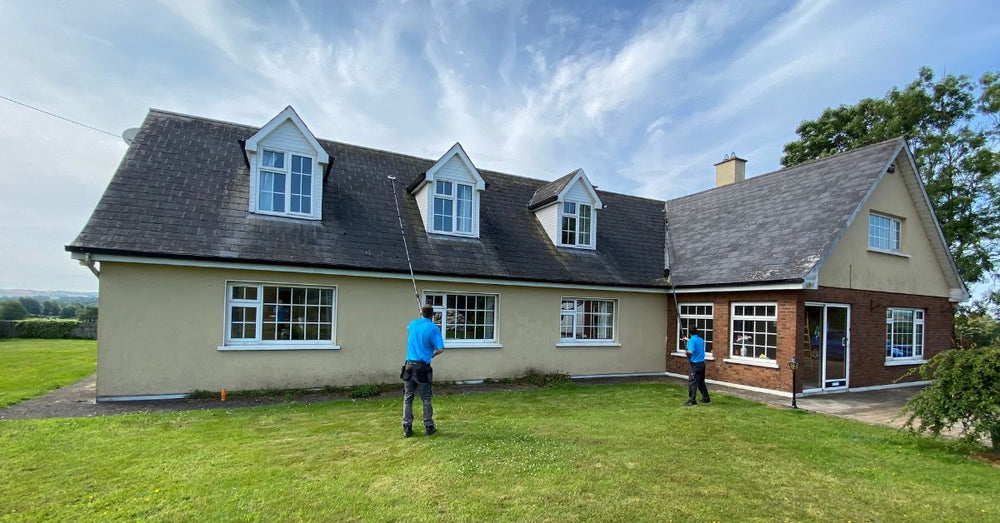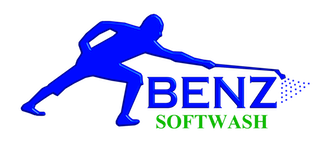
Some soft washing contractors have been using sodium hypochlorite (SH) that's been approved only for use in swimming pools, milking parlours, or other uses other than for soft washing.
And we've noticed erroneous assumptions being made about the legal use of sodium hypochlorite for soft washing. A lot of misunderstanding, confusion and myths have arisen from these assumptions.
So we decided to get to the truth and reality of the current situation regarding the use of sodium hypochlorite for soft washing.
We asked the Health & Safety Executive (HSE) these questions
1) "Is it illegal to use an HSE approved product for a use other than the specified use in the conditions of approval?"
HSE: “Yes, if the product is not used in the correct way as specified in the conditions of approval then it is illegal.”
2) "Is it illegal to alter an HSE approved product by adding dish washing soap, or other additives, to change the characteristics of the product?"
HSE: “The Approval Holder can alter the formulation of their approved product. However, the approval holder must apply to the HSE for an amendment to the product formulation. The amendment must be approved by the HSE before they can advertise, sell, supply, market, or use the product.
“If the approved formulation is altered in any way, the conditions of approval have been broken and this is an illegal act.”
We received the above responses direct from the UKCA (UK Competent Authority) for Biocides. The wording above is exactly that which we received in an email from the HSE and which we have on file.
Not content with that, we asked the Irish Pesticides Registration & Controls Division (PRCD) these questions
1. "Is it illegal to use a PRCD notified product for a use other than the specified use in the conditions of approval?"
PRCD: "Yes, product should only be used as indicated on the label."
2. "Is it illegal to alter a PRCD notified product by adding dish soap or other additives to change the characteristics of the product?
PRCD: "Yes, product should only be used as indicated on the label unless the use of the dish soap is indicated as an adjuvant to be used at the same time."
3 "If a specific adjuvant has not been included in the original PRCD notification, and printed as being legal and safe to use on the product label, would it be illegal to add that adjuvant?"
PRCD: "If the product is not used as per label then it would be an illegal use. Adding something to the product in use that may/not increase the efficacy of the product, if not on the label that is notified to PRCD is an illegal use."
We received the above response direct from the PRCD Biocides Team. The wording above is exactly that which we received in an email from the PRCD and which we have on file.
The dangers of using non-approved softwash chemicals
- A contractor's insurance policy, both public and employer liability, could be made invalid.
- If there was an accident, and the contractor's insurance policy was deemed invalid, they could be held personally responsible and liable for all court costs and compensation payments.
- The contractor could be fined for breaking the law.
- The contractor could have their business shut down by the Health and Safety inspectors, who have the power to do this.
Quick tip: This article is Part One of a 2-Part series in which we elaborate on the legal facts around using sodium hypochlorite (SH) for soft washing. Click here to read Part 2
Click here to download a FREE Professional Soft Wash Pricing Guide
We hope you found this information helpful and sincerely wish you great success in your soft washing business,
Team Benz
Click here to explore the full range of Benz softwash cleaning products
Legal disclaimer: All information and documentation available on this website and in Trade Tips articles is offered as a free service to our customers without warranty as to the information and documentation's legal standing or effectiveness. Downloading and use of the information and supportive documentation supplied on this website does not imply that we are acting as your authoritative and competent legal or technical advisers. Always do your own research and consult a qualified solicitor, accountant, or other relevant professional about any regulatory, legal or technical matter concerning your independent soft washing business.



Responses
Leo
Hi Graham – we’ve never experienced a problem with Blackwash marking walls after cleaning gutters and soffits.
Blackwash at 10:1 is very safe and will not damage brickwork.
If you want to be absolutely certain I suggest spraying the brickwork first with fresh water. And then immediately after treating the gutters and soffits.
And always, whenever you are not 100% sure of tackling a new job always treat a small, obscure test patch first. Get your customer to look at it and agree for you to continue with the remainder of the property.
Best wishes
Leo
July 06, 2016
Graham
July 06, 2016
Leo
Hi Eamon,
Yes, use Benz Blackwash at 10:1 dilution on upvc. Just spray (brush in if heavy soiling) , leave for 15-30 minutes, and hose off.
Not sure what you mean by “dye” tiles. Do you mean, will it discolour them? If so, not in our experience when used between 5-10:1
The rule of thumb is always treat a small test patch, and get the customer to approve the result, before treating any surface you are not familiar with.
June 22, 2016
Leo
Hi Charlie – thanks for that. We will come across the pond as soon as we can! :)
June 22, 2016
Charlie
Wish your products were sold in USA. You guys have your act together
June 22, 2016
EAMON MCGEE
Can. It be sprayed on pvc dormers and can it dye tiles on roof
June 22, 2016
Leave a comment